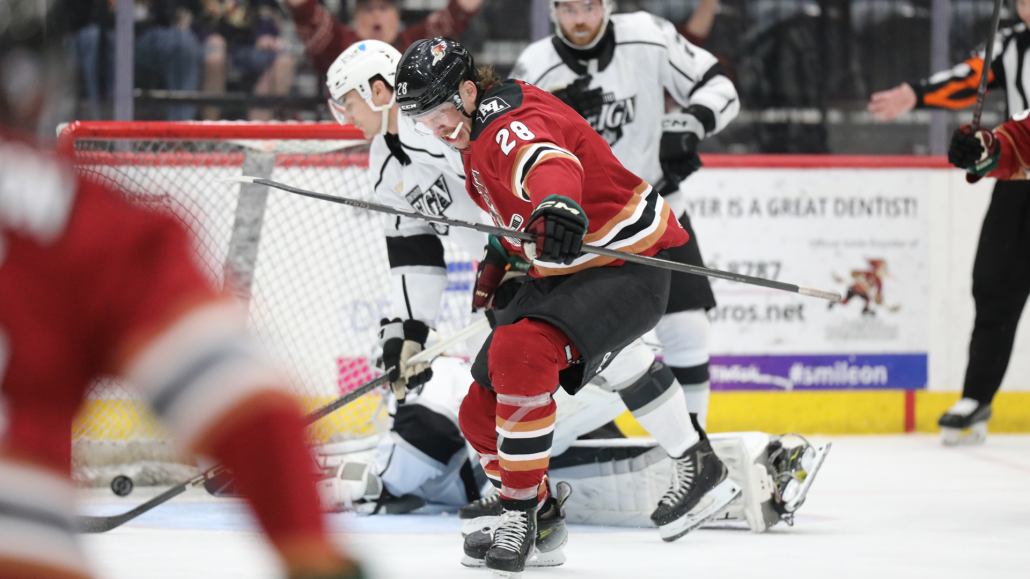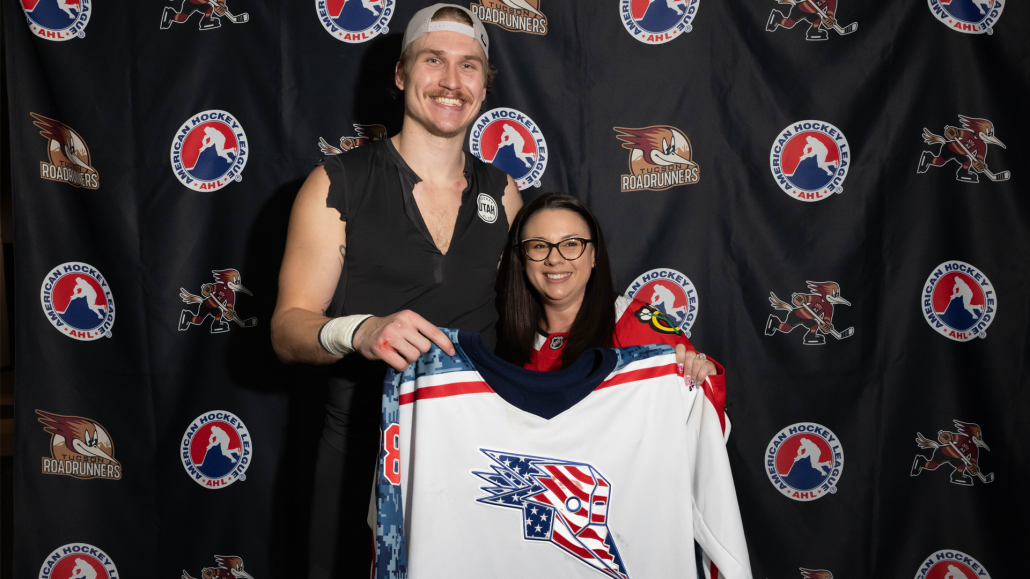1-On-1: with Curtis Douglas
Roadrunners forward Curtis Douglas joined Jonathon Schaffer and Kim Cota-Robles on this week’s Happy Hour Show. For the complete conversation and to hear about March Mullets 4 Mental Health, download the episode below. If readers would like to donate to Curtis’ fundraiser, click HERE.
Listen to “March Mullets 4 Mental Health” on Spreaker.
Can you talk about Mullets for March and how do you take care of your mental health on these long road trips?
I think on the road it’s a little bit weird because we stay with roommates so I’m with my guy the whole time, but it helps in a sense where we’re all really close group, and we kind of get stuck together, so we kind of get to feed off one another in that sense. If someone’s feeling down or feeling out of it or whatever the case may be, we’re pretty easily able to spot that and kind of bring our guy back into the mix and to be able to offer support mentally. I personally love to read, so on the road I like to try and find some time to myself and maybe go outside and just kind of be with my thoughts and read and do that sort of thing. It is March and every March for the last four years; I’ve done march mullets for mental health with the tagline as #AskMeAboutMyMullet. My mom and family and I kind of sat together and came up with that one and the main goal of it that being a lot of people come up and ask “hey, what’s going on with the mullet?” and then almost every time it ends in some sort of conversation surrounding mental health and whether it’s that they were affected or one of their family members or whether it just be me talking about the whole kind of movement thing, it just starts this conversation surrounding mental health and that was the main goal. Just to just start conversations that are somewhat uncomfortable and sometimes tricky situations, but at the same time you never really know how much that person that you’re talking to need that conversation. So, the main tagline being to go and ask people that you’re close to, that you care about, how they’re doing, and not how they’re doing on the surface level, like not a “hey how are you,” more so being like a “hey how are you really doing with everything,” that’s going on and it usually comes into topics that they don’t generally share on the surface level and I think that’s really important. Like I said, some people can really put on a brave face and seem like they’re just totally fine, but underneath, they’re struggling and sometimes just those little conversations, and showing that you can be there for them and with them and not necessarily need to command and help them through, but just to be there to listen and be a personal support can tremendously impact someone’s life in a positive way. That’s been the main piece of March Mullets 4 Mental Health. I mean, I do have the stupid mullet going on, but it’s for a good cause and I get a lot of questions about it. That’s the positive effect that I think it has brought on and the other part of it is the mullet itself. I’m raising money for the CAMH, the Center for Addiction and Mental Health Foundation and it’s an organization from where I’m from in Canada. It does a ton of organization and fundraising opportunities and just overall like groups and movements around mental health. They’re very underfunded in most places so any bit of donation or money helps but like I said, it’s not really the main goal for the donations part. It’s just kind of like a side thing. It’s more so about the conversations and awareness.

Do your teammates talk to you about mental health more during march?
Yeah, was going to say it’s pretty cool to me, obviously it’s not the end all be all, it’s not what I’m going for, but it’s cool when people come up to me at the rink, or see me in public, and they come and ask, even if it’s February, December or whatever, and they come up and they’re like “hey, are you still doing the mullet thing for March? When’s the mullet coming?” And then we get to talking, and usually it ends up getting to the point of mental health which is really cool to me, and I’ve had a few people that have even came up and kind of told me their stories and confided a little bit in me, which I think is just so cool, and has been so much of a blessing in doing this, that I honestly didn’t anticipate, which was really cool. I think a lot of people come up, like the people on the team, they come and ask how the thing is going, and like I said, just talking about the mental health piece, you get to get kind of behind the curtains sometimes and it’s just such a special experience and it’s so cool to see some of the confiding, and talking a little bit about whether it be themselves or family members or friends. It’s a blessing and I urge people to do the same with, doesn’t have to me obviously, but with people that they’re close to. Just getting things off their chests, whether it be to someone that they can help, or whether it be mental health professional, I think it could do a lot of people some wonders and benefit a lot of people tremendously. I think seeking help is one of the most courageous things that you can do, and I think a lot of people see it when they’re thinking of themselves as being the opposite which is just such sad way to rationalize things. Seeking help is just so underrated, it can help people so much, and I urge people to do that if they can.

What are some of the hardships that come with the job when you’re a professional athlete? People think it can be all fun and games because you play hockey but at the end of the day it’s still a job.
I think I was saying to someone the other week that sometimes you can get into your own head with all the hockey stuff, and all the all the standings and points and you kind of forget what it’s all for. I remember a few weeks ago, an example, I was pretty tired we had a practice and then we had a community event, and I wasn’t dreading going, but I was pretty tired and then we got there and someone came up to me and they were like “hey, I wanted to let you know that the stuff you’re doing for mental health, like, I’ve been on the other side and I just want to thank you.” That made my year, and it was really special to me and I kind of had to take a step back and just think about where we’re at and what’s going on. At the end of the day, I am grateful, and I have to just take a step back and look at what’s going on. The fan portion is just so cool, and sometimes we can take that for granted, the position that we’re in and able to make these people happy is so cool and seeing those kids and being in a position to make someone’s day a little better is really special. I think that sometimes we have to take a step back and really cherish that because it’s not going to last forever.



